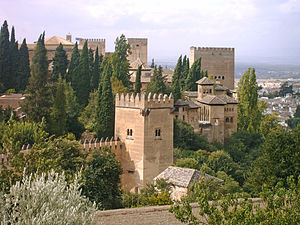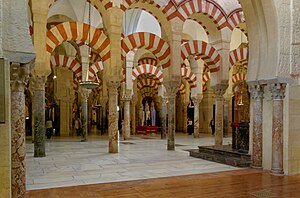Spanish/Contents

|
¡Aprovéchalo! |

|
Lessons
[edit | edit source]



Páginas generales
[edit | edit source]Punto de partida
[edit | edit source]"A starting point" — the basics of conversation and grammar.
- ¿Cómo te llamas? — Greetings, names, the Spanish alphabet.
- ¿Cuándo es tu cumpleaños? — Numbers, ages, dates, birthdays.
- Introducción a la gramática — Articles, regular verbs, questions and exclamations.
¿Qué opinas?
[edit | edit source]"What do you think?" — a world of opinions and viewpoints.
- ¿Dónde vives? — Countries, Habitations, "O" and "A" Adjectives, City and Countryside.
- ¿Qué te gusta hacer? — Sports and Activities, UE Verbs, Complex sentences, Negatives, Opinions.
- ¿Qué comes? — Food and Drink, In the Shop, "E" and Consonant Adjectives, Colours.
¿Cuándo se hará?
[edit | edit source]"When will it be done?" — The busy world of time.
- ¿Qué hora es? — Telling the Time, Times of Day, Time-related Adverbs, Reflexive verbs.
- ¿Adónde vas a ir? — Simple Future, Holidays, Accommodation, IE verbs.
- ¿Cuál es tu trabajo? — Jobs and Occupations, Little Words, Workplaces, Future Tense.
Appendices
[edit | edit source]Vocabulary
[edit | edit source]- Thesaurus of Spanish cognates
- Common false cognates
- Everyday vocabulary
- Translation Reference (archived)
- Common words (archived)
- Idioms (archived)
- Slang words (archived) from different countries
- Spanish phrasebook on Wikivoyage
Grammar
[edit | edit source]- Grammar Index (Archived) is a former section of the Spanish book, with information in pages on Spanish grammar.
Verbs
[edit | edit source]- Spanish/Tenses is a grammar appendix which outlines all possible verb conjugations for regular Spanish verbs. Verbs are first divided by mood (indicative, subjunctive, imperative), then by aspect (simple, perfect, continuous, perfect continuous), and finally by tense (present, preterite, imperfect, conditional, future). This appendix can be used as a reference for any and all regular verb conjugations.
- Spanish/Verbs (archived) is a guide to verbs, with some other pages in it too.
Nouns
[edit | edit source]- Valuable noun-related phrases (perfect for the beginner). Will prove valuable for also learning present tense and past tense. Can be used to learn the sentence structure.
Pronouns
[edit | edit source]- Spanish/Pronouns An introduction to pronouns.
Other materials
[edit | edit source]The materials below are mostly miscellaneous or incomplete.
Incomplete lessons
[edit | edit source]- Las personas — Describing people and opinions about them.
- La escuela — School, ser versus estar.
- El tiempo pasado — The past tense- All about the past tense in Spanish: Preterito, Imperfecto, Differences between the two.
Learning
[edit | edit source]- Ask questions at the Question and Answer page.
- Request for improvement to the Wikibook at the request page.
- Archived materials have more lessons which you can use.
- How to Study Spanish is an archived guide to the proper way to learn the language.
- Web Resources is a page with links to other websites you can go to to learn Spanish.
Alternative methods of learning
[edit | edit source]- The Wrong Way To Learn Spanish: An alternative and fun method of learning Spanish
- Dictionary: A dictionary related to the alternative method.
- Part 2: Translation of sample paragraphs.
Contributing to this Wikibook
[edit | edit source]This is a Wikibook—please feel free to edit, enhance, update and add to it, in any way that will make it a better teaching resource! Especially if you are a native Spanish speaker, please consider recording sound files for any of the dialogue or vocabulary. It seriously improves the learning potential of the book if you can listen as you read! A list of the people who have contributed to this featured book is here.
The book already has all of the most basic information allowing you to construct a simple sentence, and say a few things in Spanish. However, do try to help by adding some more information on other topics that are not here. As you write, remember that people reading this book can be totally new to the language. Do not write as if you are writing for another Spanish speaker, but keep in mind to explain things in great detail to enable learners to use this book easily.
Contribute to this book to make it a good way for new learners to learn the Spanish language!
